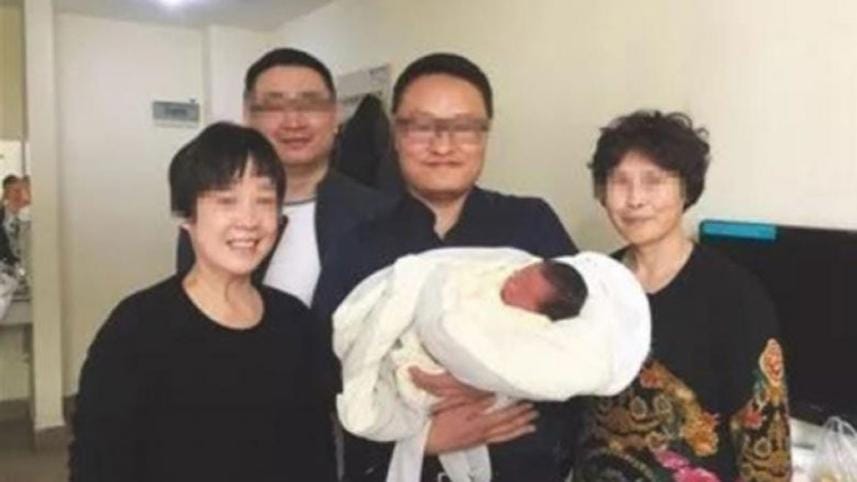Baby born 4 years after his parents' death in China

After their only children died, two elderly couples have gone to extreme lengths to carry on their family line through surrogacy, reported Beijing News on Tuesday.
Shen Jie and Liu Xi, a couple from Yixing, East China's Jiangsu province, died in a road accident on March 20, 2013. It happened five days before a scheduled transplantation that would embed embryos created using in vitro fertilization to the woman's womb to help the infertile couple have children.
As Shen and Liu were both the single children of their families, the embryos preserved at Nanjing Gulou Hospital became their grieved parents' only hope of carrying on their family line.
However, as there is no regulation in China on how to dispose of non-transplanted human embryos, the parents of Shen and Liu had encountered obstacles in retrieving the embryos from the hospital.
To obtain the rights to dispose of the embryos, the parents of Shen Jie brought a lawsuit against the parents of Liu Xin because "suing the hospital would be too risky."
In the first trial of the case, the Yixing People's Court rejected the petition of Shen's parents to take the embryos back from the hospital on the grounds that "an embryo has the potential to develop into a life, so it is not allowed to be transferred or inherited like other objects."
But the couple was granted the rights to dispose of the embryos in the second trial by the Intermediate Court of Wuxi considering "the embryos left by Shen and Liu are the only carriers of the two families' bloodlines, and they carry the memories of their parents and can provide emotional consolation to them."
In September 2014, after winning the rights to deal with the embryos, Shen Xinnan, the father of Shen Jie, asked Gulou Hospital of Nanjing to hand over the embryos to him.
The hospital, however, said the embryos could only be transferred to another medical institution rather than an individual.
As no hospitals in China were willing to accept the embryos, Shen was forced to look to medical institutions overseas.
In June 2016, he obtained approval for receiving the embryos from a hospital in Laos with the help of an agency that offers surrogate parenting services.
The two couples then recovered the embryos from the Nanjing Gulou Hospital and kept them in a liquid nitrogen container.
After retrieving the embryos, the couples faced another problem – how to find a surrogate mother?
According to a regulation issued by the then-Ministry of Health in 2001, surrogacy is banned in China. The regulation states that "assisted reproductive technologies should be used in accordance with the country's family planning policies, ethics and related laws" and "any form of surrogacy is not allowed."
That meant the desperate parents had to seek surrogacy services from underground agencies.
Shen Xinnan had contacted dozens of surrogacy agencies before he met a man named Liu Baojun, who runs such an agency.
At Liu's suggestion, Shen chose a hospital in Laos to receive the embryos as commercial surrogacy was not prohibited in the country (Laos has promulgated a regulation that bans commercial surrogacy in January).
A Laotian surrogate mother was chosen among more than 20 candidates to carry the embryos. After the embryos were transplanted into her uterus, the pregnant woman stayed at a house in Laos shared with several other surrogate mothers to prepare for delivery.
During her pregnancy, Liu regularly informed Shen of the condition of the surrogate mother.
"We tried not to let her feel uncomfortable because she was put under special care and different from the other surrogate mothers," said Liu.
On Dec 9, 2017, the Laotian woman gave birth to a baby boy in a hospital in Guangzhou, South China's Guangdong province. His maternal grandmother gave him the name Tiantian (literally sweetness) in the hopes of bringing happiness and sweetness to the bereaved families.
When Tiantian was 100 days old on March 18, Shen Xinnan arranged a low-profile celebration for his grandson.
"This boy is [destined to be] sad upon his arrival into the world. He does not have parents. We will have to tell him the truth one day. That is inevitable," said Shen.
Shen said he would lie to Tiantian that his parents had gone overseas, and then tell him the truth when he grows old enough.



 For all latest news, follow The Daily Star's Google News channel.
For all latest news, follow The Daily Star's Google News channel.
Comments